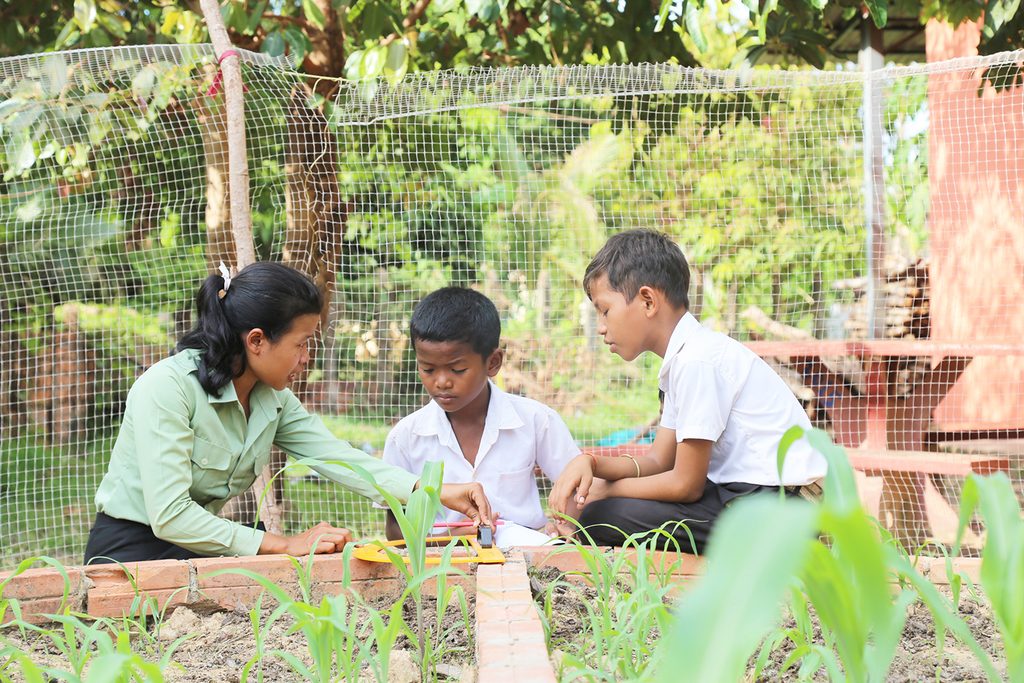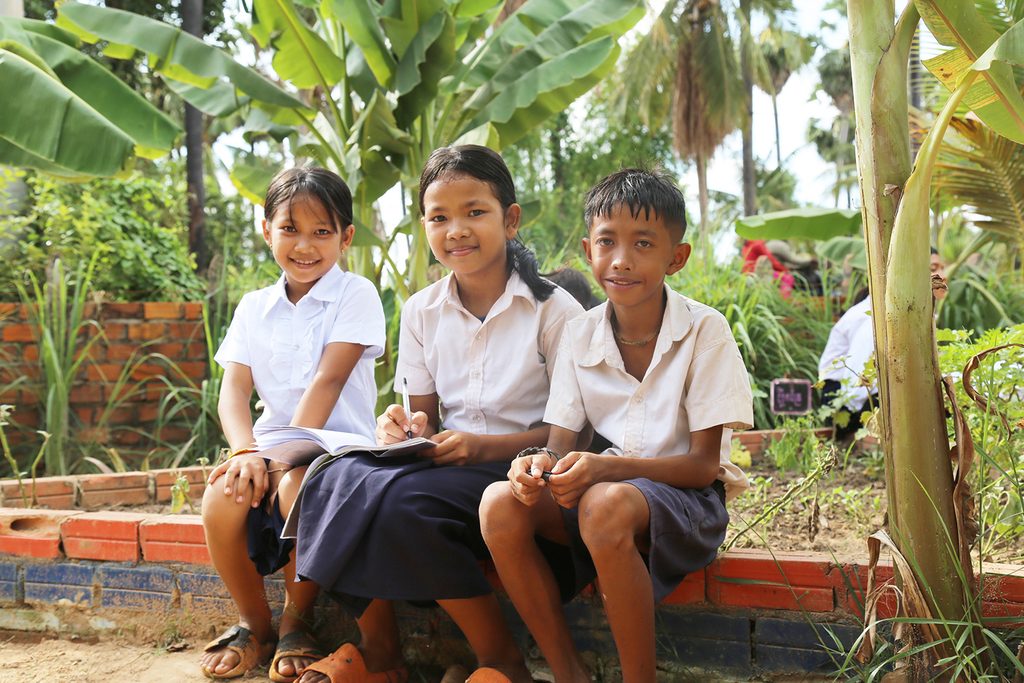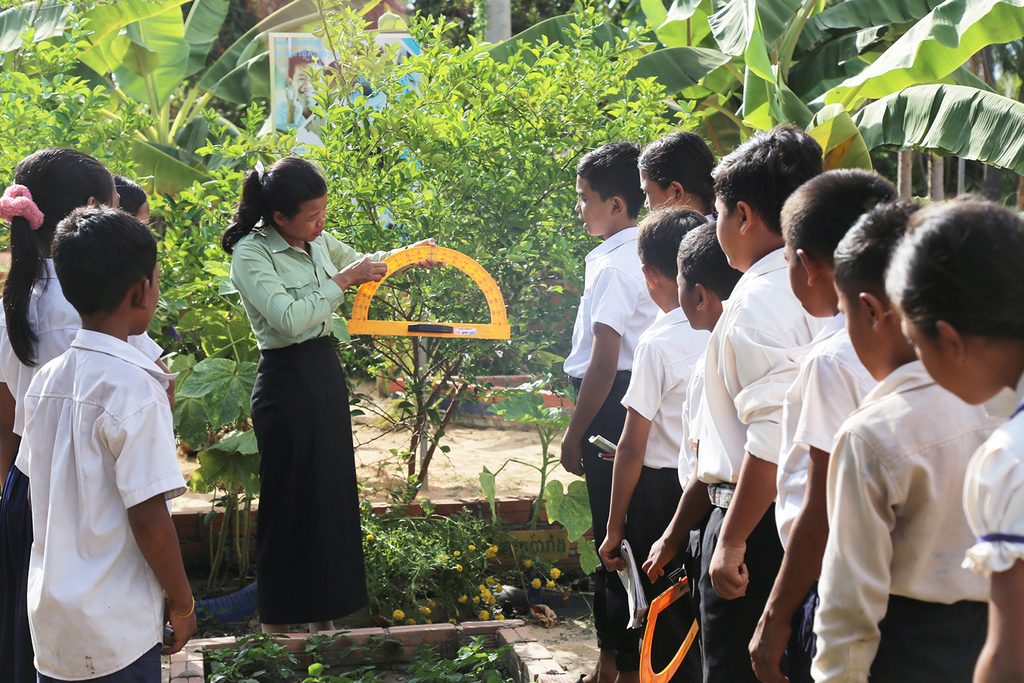Children’s knowledge grows in school learning garden
At a primary school in Cambodia's Siem Reap province, students are enjoying learning with their teacher Keo and receiving more support for their studies at home, extending their learning beyond the classroom.

Keo is teaching a group of students how to solve maths problems through hands-on activities in the school’s learning garden.
Keo has been a primary school teacher for almost 5 years. Recalling her lessons before the garden was set up, she says her classes strictly followed the plans in her textbooks and were always classroom-based. “I did not use many educational materials or involve the students in any activities,” she says.
However, she found that this rigid way of teaching meant that some students struggled to learn and lost confidence in their abilities. “Even though I tried my best to explain the lessons, many students could not grasp the concepts. At the end of the school year, some students dropped out and others had to repeat the grade,” says Keo with a hint of sadness. “I was unhappy because I felt I had failed them as their teacher.”
“The garden integrates real-life lessons for the students. It helps us teachers to better connect with the students.”
Keo
Benefits of the school learning garden
Keo attended a course that trained teachers in new, engaging teaching methods and how to use the garden to teach a variety of subjects, including science, maths, social studies and Khmer language. “We organised the garden into mathematical shapes and linked it to related subjects and life skills,” explains Keo.
The garden now supports students in grades 4, 5 and 6 to improve their knowledge, skills and attitudes about healthy eating, gardening and learning in real-life contexts. Outdoor learning has increased the students’ enjoyment of school, which is reflected in their attendance and academic performance.
“The garden integrates real-life lessons for the students. It helps us teachers to better connect with the students,” explains Keo.

“Thanks to the garden, the students show a remarkable enthusiasm for learning. They are now willingly attending school on weekends and holidays to look after the plants and discuss their homework with friends,” says Keo. “I have noticed that the students enjoy learning more and the dropout rate has decreased.”
“I have noticed that the students enjoy learning more and the dropout rate has decreased.”
Keo
The gardens have also proved beneficial to teachers, who have seen an increase in support from the local community and parents who are proactively working to improve the teaching and learning environment at the primary school.
“Teachers and students now have a better relationship, and students work better in groups without worrying about gender differences,” says Keo, adding: “Teachers play a crucial role in promoting equal participation of all students and creating an inclusive, safe environment.”

As Keo shows her students how to use a protractor to measure the angles of the raised flower beds, the children listen attentively and ask many questions. “I am happy to be able to help my students excel in class,” she says. “I love my job and want to continue to improve my knowledge so that I can help them even more.”
Plan International Cambodia’s intervention
The school garden at Keo’s school was established as part of Plan International Cambodia’s “School Learning Garden” project funded by Australian NGO Cooperation Program through Plan International Australia. The project aims to ensure that girls and boys, especially the most marginalised and vulnerable, are healthy, educated, and empowered to fulfil their potential in Siem Reap Province. It supports students in grades 4, 5, and 6 to improve their knowledge, skills, and attitudes around healthy eating and gardening and enjoy learning in 4 key subjects including Khmer, Mathematics, Science and Social Studies in real life contexts. This enjoyment of learning is reflected in improved learning outcomes, measured by student attendance and performance in these subjects.
Plan International Cambodia trains teachers on teaching methodologies and how to create learning and teaching materials for the school learning garden. Keo and her colleagues organised the garden following mathematic shapes and also displayed a glossary in the school kitchen.
Categories: Education


